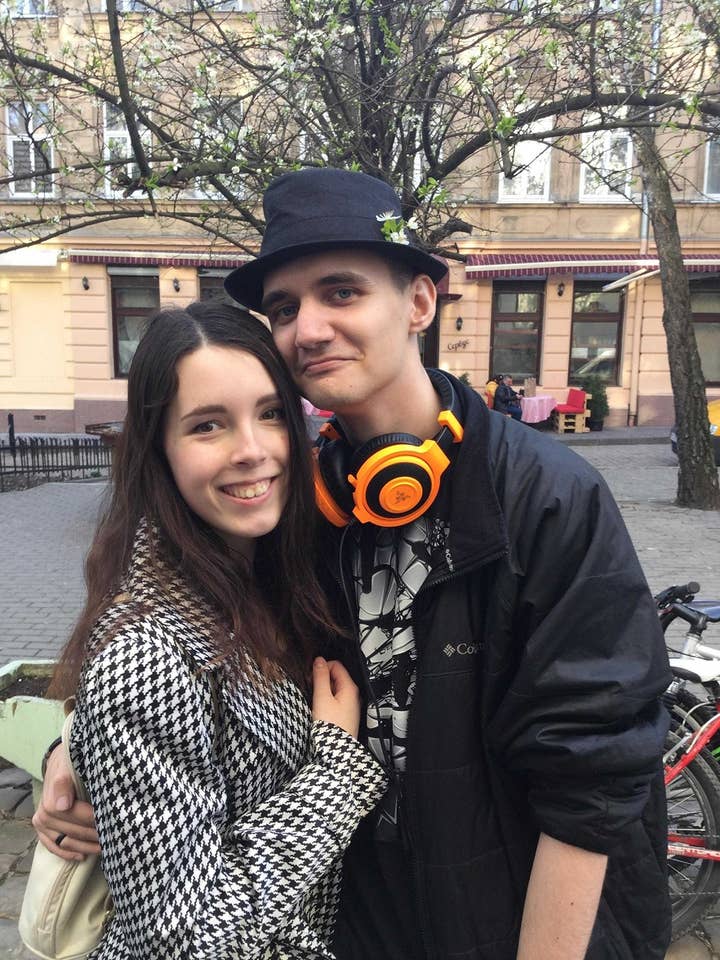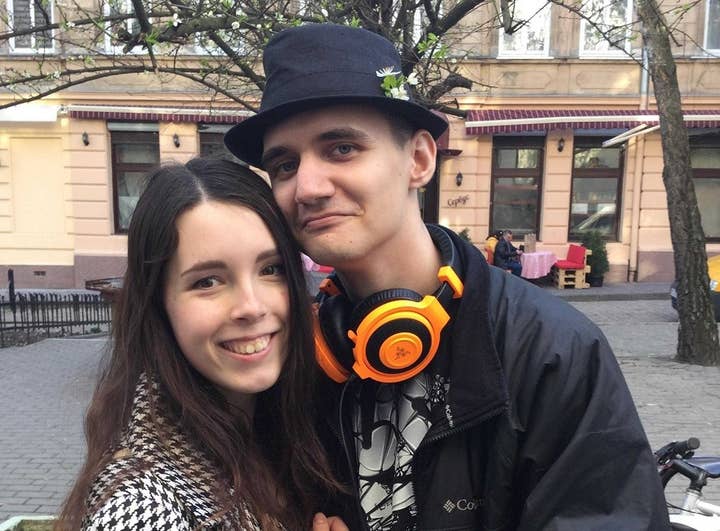What's it like for a game dev in Kyiv?
Alex Molodkin of Ukrainian studio Weasel Token describes life in a city under siege
"When it all started, everyone but me was sleeping. I heard some distant explosions."
That's Kyiv-based developer Alex Molodkin, who along with his partner Tay Kuznetsova comprise the two-person studio Weasel Token. Weasel Token is currently working on Puzzles for Clef, a "peaceful 2D puzzle adventure with a treasure hunt at its core," but there's obviously not much work getting done ever since Russian forces began a siege of Kyiv.
Molodkin tells GamesIndustry.biz about the first night of the siege.
"I was working on our game and I had to stop and wake everyone up," he says. "It was a hard first day because the realization that you're suddenly plunged into war is very difficult to take in. It all seems like a nightmare. But then the realization sunk in and we started feeling a bit more practical about it. We moved everyone from the rooms to the hallway and we've been living in the hallway since day one because all of our rooms have windows and outer walls, so it would be very difficult if there were explosions nearby."
Molodkin lives in an apartment building. Some of his neighbors still live there. One moved to a nearby shelter.
"We have [a shelter] nearby but it would be difficult for my grandmother especially because she has issues with her legs," he says. "If the worst comes to pass we'll have to locate there for a while but hopefully it won't be for a long time because that would be just impossible for her."

Molodkin and Kuznetsova have been bracing for this since the start of the year.
"When everyone in the world panics, even if you don't follow the news, you start hearing some echoes of it," he says. "When the neighboring country builds up its military along your border, it's hard not to notice. The hope was they would contain the conflict in some localized areas like the Donbasas and it wouldn't be a full-out invasion."
However, that hope faded when Russian president Vladimir Putin recognized the sovereignty of Eastern Ukrainian cities Donetsk and Luhansk in a speech February 21, saying "all responsibility for the possible continuation of the bloodshed will be entirely on the conscience of the regime ruling on the territory of Ukraine."
"At that point we were pretty sure that we were doomed, yeah," Molodkin says.
He says that local news reported several hundred thousand people had evacuated Kyiv, but in a city of several million, that still leaves the vast majority in harm's way.
"While me and Tay could evacuate to Western Ukraine for example, we wouldn't just leave my family and her family here, so it was not an option for us"
"The whole problem was that evacuating was -- I wouldn't say impossible, but it would be hard to do with a family of four people," Molodkin says. "While me and Tay could evacuate to Western Ukraine for example, we wouldn't just leave my family and her family here, so it was not an option for us."
They began contingency planning, but he describes it more along the lines of "Let's just think what we might take with us if we have to evacuate" rather than "Let's pack our bags." His neighbors seemed to take a similar approach; there was little in the way of stocking up or problems with people hoarding supplies from local stores.
"No one here actually did that," Molodkin says. "You'd see everything was a fine, perfectly normal day in the supermarket. But once it all started, we had to run to the local marketplaces and stockpile a bit of the bare minimums. It's still hard to stockpile too much, so we have to venture out every few days to get more food, etc."
There's a curfew in Kyiv at the moment so people can only venture out during certain hours, and the grocery stores have limited stock, but they are still open and during those hours Molodkin says the city still feels as populated as ever.
Molodkin says Puzzles for Clef publisher Freedom Games has been supportive in ways big and small. Some of the most helpful support they have received came in the form of a delivery of publisher swag a few weeks ago that turned out more helpful than anyone would have expected.
"We received some very cool flashlights from them and it's very helpful currently because when we go into rooms, we have to keep our lights off because that would help targeting of Russian forces," Molodkin says. "So having a couple new flashlights was really great. There were some other items that are helpful as well, like a bottle for evacuating, a bottle for water, etc."
Freedom also suspended deadlines on the game, which is good because Molodkin says all development has halted.
"It's pretty much impossible because most of the time you're just trying to follow the news," he says. "Me and Tay take turns sleeping. My mother and grandmother have to try sleeping normally, so we take turns. When one of us is asleep, the other follows the news for air danger alarms and wakes everyone up when necessary.
"When one of us is asleep, the other follows the news for air danger alarms and wakes everyone up when necessary"
"Even when it's not an alarm time, you try following where new explosions happen because even if it's not nearby, you want to follow where the action is currently because you might have friends there or relatives. When someone might be in danger you message them instantly.
"It's hard to break out of this loop. You're straight back to this topic whenever you try to do something else."
That's not to say the loop hasn't changed a bit. Molodkin says he and Tay were waking everyone up more in the first days of the siege.
"Basically whenever there was an air danger alarm, everyone was woken up and we made everyone come to the hallway," he says. "But people get used to pretty much anything, so once we realized some air danger alarms are not as important for this specific location, we just started listening to the explosions themselves. So if they're very far away or if we don't hear them at all when the alarm hits, we might just try ignoring it and let everyone sleep just because it's hard to wake up every half hour. You would basically get no sleep if you followed every alarm."
Through it all, Molodkin has seen the world's reaction to the invasion, which he describes as ranging from great to mediocre and disappointing.
"It's understandable that other countries want to just avoid getting into the conflict themselves, but the whole speed of applying sanctions to Russia, the responses of European Union and NATO... it was always a bit slower than we would hope for," he says. "However we're still grateful those responses exist at all, and we're grateful for all the humanitarian and military help we get, even if they're not participating directly. We understand why they can't. We're more or less fine with the external reception of this whole situation."
For individuals wanting to support Ukraine, Molodkin suggests donating to the country's Armed Forces or The Return Alive Foundation.
One part of the world's reaction that seems to be particularly disappointing for Molodkin is that of his closest peers in game development.
"While some people are amazing and supportive, many people just try to stay out of it. And we really don't think it's time to stay out of it"
"An important part for us is the Russian part of the game dev community understanding what's happening," he says. "We've been seeing a very neutral response from them, and the thing is all the Russian-speaking countries are very intertwined when it comes to the game development industry. All the chats you have in Telegram, Discord, etc. are basically a mix of people from Ukraine, Russia, and Belarus, and no one actually cared about which country exactly you're from. But the sad thing is while we're suffering here, most of them just care about, 'Hey we're under sanctions, we can't get our money from Steam or from an abroad publisher? What do we do now? Which bank isn't under sanctions yet?'
"They usually twist it under the whole premise that many chat spaces on the internet are discussing this political thing, so let's keep politics out of our chat because we have other problems to solve. What they don't realize is we don't have the problems they have, so if they only want to talk about their personal problems, they're acting [hypocritical] by ignoring the problem they've caused to us.
"We've tried to spread awareness about it, because while some people are amazing and supportive, many people just try to stay out of it. And we really don't think it's time to stay out of it."
For now, Molodkin and Kuznetsova are staying put in their Kyiv apartment. He says the evacuation trains that are still running are mostly reserved for women, children and the elderly, so they wouldn't be able to leave together even if they wanted to.
"We just hope for a victory for our side. We're optimistic; our forces are putting up a hell of a fight. Most of the people here I think didn't really expect to fare that well against the so-famous Russian military. But apparently there is more to their reputation than to their actual skills, thankfully. So while we're in a very depressing mood, we still hope for our victory to happen and we believe it's possible."

